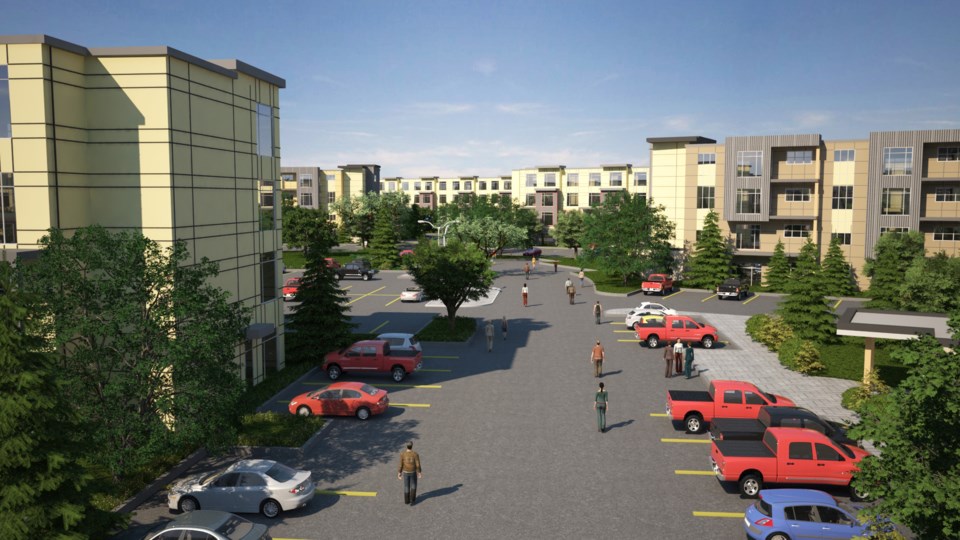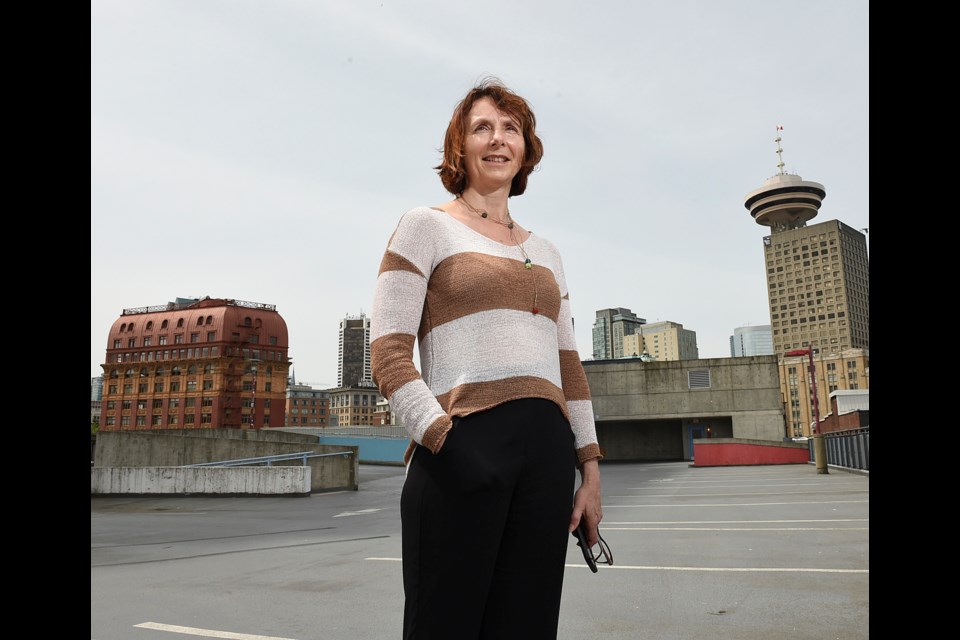That song made famous by Joni Mitchell about paving paradise to put up a parking lot is on Mary Clare Zak’s mind as she walks along a corridor leading to the Gastown Parkade.
Mitchell wrote “Big Yellow Taxi” in the late 1960s.
Almost 50 years later, Zak, who is the city’s managing director of social policy, is interested in the extension of the song’s memorable lyric in the form of a question: What now do you put on that parking lot, or parkade, when fewer people are driving cars into downtown?
There are currently two answers to that question.
One is take a large chunk of the top floor of the city-owned Gastown Parkade at 160 Water St. and build two permanent daycares on it. The other involves using the city-leased parkade behind the former Bosman Hotel at 1060 Howe St. and place temporary modular housing on it.
The city is going ahead with the projects at a time when finding land for housing and daycare centres is becoming increasingly difficult and expensive as Vancouver gets more dense.
“We know in the downtown, we’re short almost 800 spaces of childcare,” said Zak, overlooking the top of the parkade, where 20 vehicles were spread across a space marked with more than 200 empty parking stalls. “We’re short almost 18,000 [childcare spaces] across the city. It’s a really pressing need for us. So opportunities like this are really great.”
Price tag at $6 million
The city wants to first build a 37-space daycare on the parkade before developing another similar-sized facility almost adjacent to the first one. The price tag is estimated at $6 million, with the city hoping to get contributions from the provincial and federal governments.
Questions of children’s safety, pollution and the load pressure of a new building on the parkade have been investigated and answered to the satisfaction of the city.
“As you can see from being up here, the air smells great, there’s a nice breeze from the ocean,” said Zak, noting Vancouver Coastal Health has visited the proposed site. “They feel it’s just fine.”
The city will incorporate a strategy to accommodate parents using vehicles to drop off their children, although Zak believes many parents in the neighbourhood will walk or take transit to the daycare.
A staff report that went before city council in May 2015 revealed that more people than ever before were taking transit, walking and riding bikes to get around Vancouver instead of relying on a vehicle for transportation. In fact, city engineer Jerry Dobrovolny pointed out to council in 2012 there were fewer cars travelling into downtown than there were in 1965, a few years before Mitchell wrote her famous song.
So why didn’t the city look to use parkades sooner for something other than parking cars?
“Sometimes, you don’t look up,” Zak said.
The only time, in recent memory, the city allowed a city parkade to be transformed was in November 2012 when Alterrus Systems Inc. set up a mass-producing greenhouse on a parkade at 535 Richards St.
Less than two years later, Alterrus and its subsidiary Local Garden Vancouver Inc. declared bankruptcy in January 2014. Although disappointed about the company’s demise, Mayor Gregor Robertson said at the time that Alterrus generated more revenue for the city from the space than when it was used as a parking lot.
Modular housing
A short transit ride south of the Gastown Parkade is the former Bosman Hotel, which is now used to house people at risk of homelessness. If it all works out, those tenants will soon have neighbours.
The city’s housing department is working on a plan to have a company build up to 40 “micro-suites” (with bathrooms and shared kitchen facilities) and place them on the former hotel’s parkade. The estimated size of each suite is 250 square feet.
Eligible tenants will either be on income assistance or a fixed income and could live in the suites for two to five years, depending on whether the city moves the housing to another spot in Vancouver.
Typically, modular housing is pre-fabricated in a factory and will sometimes involve recycled shipping containers. Once built, the pieces are loaded onto a truck and transported to a site, where they are assembled and hooked up to city services.
Modular housing can be built faster than permanent housing. It’s also cheaper and reduces disruption in an area that normally comes with construction of a permanent structure.Five companies will bid for the contract to place modular housing on the parkade. The same companies will also bid for a similar housing project on what is now an urban orchard near Main and Terminal.
Stack Modular is working on bids with Dialog Design and Kindred Construction. Stack has its head office in Calgary with an office in Vancouver and operates a manufacturing plant in China, where its structures are built to Canadian building codes.
Andy Berube, vice-president of sales and marketing for Stack Modular, said the company has yet to place modular housing on a parkade but welcomes the challenge.
“I’m not sure if that’s a common scenario, but it doesn’t pose any issues,” said Berube, noting a survey of the site would be done to determine the parkade’s maximum load and best way to place housing on the property.

Stack has built multi-storey apartments and is currently working on an extension of a hotel at Pacific Sands Resort in Tofino. All its projects are built with steel frames.
If Stack and its partners win the bid, the housing would be built in China and then transported at sea for 18 days before arriving in Vancouver. The housing would be loaded onto a truck and transported to the parkade, where it would be unloaded with a crane.
“We think the review of any building site has merit,” Berube said of the city’s decision to seek alternative uses to parkades. “If there’s a site that’s not being used effectively and you can leverage that, I think it’s smart.”
No rezoning
Mukhtar Latif, the city’s chief housing officer, said one of the city’s reasons for choosing the downtown parkade was because it wouldn’t require a rezoning process to have modular housing placed on the property.
“We’re trying to find sites where we can start projects under the development permit route, so that we can get those through a bit faster and get them built,” said Latif, noting the non-profit Community Builders, which manages the former Bosman, will oversee management of the new tenants.
Latif, who used to work in housing in London, England, said he was involved in projects in the United Kingdom where housing was built on parking lots. He noted the city was considering another parking lot at 2221 Main St. to be redeveloped into housing. The Vancouver Park Board is also transforming a parking lot at Smithe and Richards into a park.
“We want to be creative with the existing uses that are out there in the short term,” he said. “So if there are opportunities where land isn’t being fully used at the moment, we’re looking at alternatives to make best use of the assets, whether they’re private or public. And, obviously, daycares is one and modular housing is another.”
mhowell@vancourier.com
@Howellings



